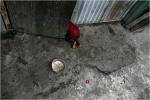Across Globe, Empty Bellies Bring Rising Anger (New York Times)
 Last week, the New York Times ran an article about the relationship between hunger and insecurity, with considerable attention given to Haiti. It notes the food rioting, the mud cookies, and the desperation that comes from not being able to feed onself and one's family. Hunger is not new to Haiti. While this article has raised awareness about hunger in Haiti, it does not go into why or offer up solutions which is unfortunate.
Last week, the New York Times ran an article about the relationship between hunger and insecurity, with considerable attention given to Haiti. It notes the food rioting, the mud cookies, and the desperation that comes from not being able to feed onself and one's family. Hunger is not new to Haiti. While this article has raised awareness about hunger in Haiti, it does not go into why or offer up solutions which is unfortunate.
 I can't say this enough. Haitians are neither passive or helpless. They are strong, hard working and entrepeneurial. Try making it on less than a dollar a day and you'll understand the importance of entrepeneurship to your survival. Haitians, however, are increasingly frustrated. It is unfortunate that Haiti has yet to see a democratically elected administration that was able to make a tangible difference in helping them meet their most immediate needs. The food rioting was largely because they felt that their concerns were not being addressed by the Preval administration. Preval made some very serious miscalculations. In response to their concerns, he replied that people with cell phones should be able to purchase food. He also said that since his wife buys the same rice they do, next time there was a protest to stop by to get him so he could participate. Here's the difference, though. Preval has a job. Most people regard him to be an honest, good person - but for those who are eating only once a day, these remarks stung.
I can't say this enough. Haitians are neither passive or helpless. They are strong, hard working and entrepeneurial. Try making it on less than a dollar a day and you'll understand the importance of entrepeneurship to your survival. Haitians, however, are increasingly frustrated. It is unfortunate that Haiti has yet to see a democratically elected administration that was able to make a tangible difference in helping them meet their most immediate needs. The food rioting was largely because they felt that their concerns were not being addressed by the Preval administration. Preval made some very serious miscalculations. In response to their concerns, he replied that people with cell phones should be able to purchase food. He also said that since his wife buys the same rice they do, next time there was a protest to stop by to get him so he could participate. Here's the difference, though. Preval has a job. Most people regard him to be an honest, good person - but for those who are eating only once a day, these remarks stung.
I find that most articles on hunger in Haiti can be summarized as follows - "Poorest country in the Western Hemisphere. Only a ninety minute flight from Miami. Less than two dollars a day. Big Families. Mud cookies. Vibrant culture. Instability".
 Articles such as these do raise awareness but it always seems to be temporary. There will be other disasters, other emergencies, and people's attention will shift elsewhere. People want to know what they can do to help now. And the solution is not to send food, but to help Haitians access the knowledge and resources they need to be able to feed themselves, feed their families, and contribute to a stable country where people live in dignity - and dignity demands food security.
Articles such as these do raise awareness but it always seems to be temporary. There will be other disasters, other emergencies, and people's attention will shift elsewhere. People want to know what they can do to help now. And the solution is not to send food, but to help Haitians access the knowledge and resources they need to be able to feed themselves, feed their families, and contribute to a stable country where people live in dignity - and dignity demands food security.
Take a look at the slideshow of pictures attached to the article. The pictures are impressive but the text for each of these photos is, frankly, shallow. For example, "There are few opportunities for employment." This is nothing we did not know already. How about some solutions? The piece goes to note "Real solutions will take years. Haiti, its agriculture industry in shambles, needs to better feed itself. Outside investment is the key, although that requires stability."
 I agree the agricultural industry is in shambles. I also agreed that Haiti needs to better feed itself and that this will take many years. But is outside investment the key? Even when Port au Prince was full of factories 20 years ago, hunger was still a problem albeit less of one. I would argue that Haiti needs to invest in its capacity to meet its own needs. Sure, a lot of the money to do so will come from donors. But if we sit around and wait for stability, nothing is going to get done, the situation will get worse, and we'll read another article like this next year, the year after that, and the year after that.
I agree the agricultural industry is in shambles. I also agreed that Haiti needs to better feed itself and that this will take many years. But is outside investment the key? Even when Port au Prince was full of factories 20 years ago, hunger was still a problem albeit less of one. I would argue that Haiti needs to invest in its capacity to meet its own needs. Sure, a lot of the money to do so will come from donors. But if we sit around and wait for stability, nothing is going to get done, the situation will get worse, and we'll read another article like this next year, the year after that, and the year after that.
The next section reads: "Meanwhile, most of the poorest of the poor suffer silently, too weak for activism or too busy raising the next generation of hungry." I completely disagree.
 Are Haitians suffering silently? To the contrary, they have been quite vocal. Some have given their lives to speak out. Who hears them? There are high profile activists and thos who, among the poorest of the poor, are the community organizers and leaders who are trying to work for change. If you don't read about them in the media, that does not mean they do no exist. Suggestion to New York Times - get a good translator and make an effort to meet them, not just in Port au Prince but also in the countryside. Most of Haiti is rural, after all.
Are Haitians suffering silently? To the contrary, they have been quite vocal. Some have given their lives to speak out. Who hears them? There are high profile activists and thos who, among the poorest of the poor, are the community organizers and leaders who are trying to work for change. If you don't read about them in the media, that does not mean they do no exist. Suggestion to New York Times - get a good translator and make an effort to meet them, not just in Port au Prince but also in the countryside. Most of Haiti is rural, after all.
The article notes how the rising foor prices have altered eating habits worldwide. In India, blessed with a country wide network of dairy cooperatives, people are consuming less milk. Lentils, a traditional source of protein, are being consumed much more sparingly. Many families no longer eat meat.
 Take a look at this video clip they have provided as well. One of the mothers interviewed has 18 children. This is a recipe for poverty. By far, the least nourished and least healthy children I have seen in Haiti came from large families. Haiti would be a very different place today if an ambitious family planning had been set into place 50 years ago. But it is not too late to ensure that women have the knowledge and the commodities they need to make a voluntary decision about how many children to have. I feel like this is something we are not talking about as much as we should be.
Take a look at this video clip they have provided as well. One of the mothers interviewed has 18 children. This is a recipe for poverty. By far, the least nourished and least healthy children I have seen in Haiti came from large families. Haiti would be a very different place today if an ambitious family planning had been set into place 50 years ago. But it is not too late to ensure that women have the knowledge and the commodities they need to make a voluntary decision about how many children to have. I feel like this is something we are not talking about as much as we should be.
There is no simple answer, but it is clear that a two track relief/developlemt approach will be needed. The country is hungry now and relief will have to be provided to ensure that Haitians are able to afford, not just rice, but the range of staples they need to get by. The developmental track will need to halt and reverse environmental degradation, expand as rapidly as possible national production capacity, and promote energy indepedence. Through it all, Haitians and the international community should be aware of what the Haitian government is doing to address their situation, how, and where. We bring up again the idea of "H Span", a radio channel that would cover ALL the proceeding inside the Haitian parliament so Haitians can hear what their elected officials are saying (or not saying) on their behalf.
 Concerning the environment, agriculture, education, familly planning and health care, there are a many, many individuals and organizations working day in and day out for a better Haiti. Through supporting one of them, you are supporting the fight against poverty in Haiti. The next generation can be born into a better Haiti where even the poorest of the poor have access to food, education, and health care. Haiti needs all of its friends to help make this happen.
Concerning the environment, agriculture, education, familly planning and health care, there are a many, many individuals and organizations working day in and day out for a better Haiti. Through supporting one of them, you are supporting the fight against poverty in Haiti. The next generation can be born into a better Haiti where even the poorest of the poor have access to food, education, and health care. Haiti needs all of its friends to help make this happen.
Bryan
Add new comment